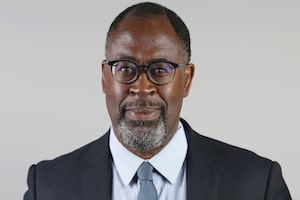Federal Conservatives will vote on a new leader this September.Darren Calabrese/The Canadian Press
B.C. Conservative MP Marc Dalton and former Conservative MP Leona Alleslev both dropped out of the party’s leadership race after they failed to meet a do-or-die fundraising deadline on Friday.
Eleven people had put their names forward for the contest. They had until Friday to raise $300,000 and collect 500 nomination signatures in order to make it onto the final ballot for the September vote.
Ontario MPs Pierre Poilievre, Leslyn Lewis, and Scott Aitchison, Brampton, Ont., Mayor Patrick Brown, former Quebec premier Jean Charest, and independent Ontario MPP Roman Baber had all already submitted the necessary paperwork and been verified by the party.
On Friday, Toronto lawyer and former Conservative candidate Joel Etienne said he submitted the required documents and funds by deadline and is waiting to be verified by the party. So is Joseph Bourgault, a Saskatchewan businessman who supported the February trucker convoy protests in Ottawa and on Friday posted a video asking former U.S. president Donald Trump for his endorsement.
So far then, eight candidates expect to be on the final ballot. The remaining candidate, Grant Abraham, did not respond to requests for comment on Friday.
Conservative Party executive director Wayne Benson said the party will confirm the final list of verified candidates early next week.
The party has made it more difficult to run for leader since the 2017 race when 14 people were on the final ballot. But even with half as many people in the race, strategists say the number of candidates and the ranked voting system complicates each campaign’s path to victory and makes predicting the race more difficult.
Leadership contests in 2017 and 2020 went down to the final ballot, and in both cases the presumptive front-runner lost.
Pundits view Mr. Poilievre as the person to beat, in particular because he has drawn massive crowds to his rallies. But with the candidates deploying different strategies, and with much of the campaign taking place outside of the limelight, strategist Melanie Paradis said it would be a mistake to count others out.
The front-runner campaigns were not expecting so many people to be on the final ballot, she said, and the sheer numbers will complicate any plans for a “first-ballot win strategy.” Ms. Paradis was deputy campaign manager for former leader Erin O’Toole and is staying neutral in this race.
In a ranked ballot election, voters list the candidates by preference. Then if their first choice is eliminated from the race, their subsequent choices will be counted until one candidate wins the majority of the votes. Ms. Paradis said the campaigns will have to adjust their strategies to make sure they’re also in contention for voters’ second and third choices.
Erika Barootes, an Edmonton-based Conservative strategist with Enterprise Canada, said with more candidates on the ballot than the four in 2020, contestants will have to do more to differentiate themselves. But Ms. Barootes, who is also staying neutral in the race, said they will have to do so without antagonizing the supporters of other candidates who they will rely on for down-ballot support.
The candidates represent the “full gamut” of Conservative politics from social conservatives to progressives – a good thing, Ms. Barootes said for a party with an uncertain direction after Mr. O’Toole’s ouster in February.
The race already has included heated attacks between the campaigns of Mr. Poilievre, Mr. Brown and Mr. Charest. Conservative commentator Tim Powers, with Ottawa-based Summa Strategies, said the lively race is engaging members, which is a win for the party. Who is winning the race though will only become more clear once the membership recruitment numbers are released from the campaigns in June.
“Just because there’s 5,000 people at a rally, that doesn’t mean 5,000 votes for Pierre Poilievre in a leadership race,” said Mr. Powers, who has also declared neutrality. Meantime, Mr. Brown is staying below the radar, rallying support without the public visibility of rallies and crowds, Mr. Powers said, while Mr. Charest’s team has had a stronger showing in recent weeks and is running as “the mature statesman.”
Ms. Alleslev was the most high-profile candidate who failed to make it onto the ballot on Friday. In a statement, she said the timeframe to raise the money was not enough.
She lost her seat, north of Toronto, in the 2021 election. She had first won the riding as a Liberal in 2015 and then crossed the floor to the Conservatives before the 2019 election. She served as deputy Conservative leader under Andrew Scheer and in her statement said she will “never waiver” in her dedication to the party.
Mr. Dalton said he wanted an extension to the Friday fundraising deadline and would have met the requirements if he had had a few more days to collect donations.
The B.C. MP was part of a last-minute push by the anti-abortion group Campaign Life Coalition, which was trying to get four social conservatives on the ballot to raise their chances of one of them winning the leadership.
Campaign Life Coalition also supports Ms. Lewis and Mr. Bourgault and was encouraging its members to raise money for Mr. Abraham as well.
“We need all four so-cons on the debate stage, as a crucial strategy to increase the odds of a pro-life victory. I know the pro-life movement can do it, if we give it one last push!” Jack Fonseca wrote on the group’s website.
For subscribers: Get exclusive political news and analysis by signing up for the Politics Briefing.
 Marieke Walsh
Marieke Walsh Ian Bailey
Ian Bailey